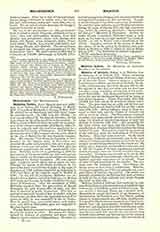

Melendez Valdes, JUAN, Spanish poet and politician, b. at Ribera del Fresno (Badajoz) March 11, 1754; d. in exile at Montpellier, France, May 24, 1817. He studied law at Salamanca and while there, began his poetical career. In 1780, with his “Batilo”, he won a prize offered by the Spanish Academy for the best eclogue on the pleasures of life in the country. In 1781 he went to Madrid where he made the acquaintance of the minister and author, Jovellanos, whose favor he enjoyed, and who had him appointed to a chair in the University of Salamanca. In 1784 Melendez was one of over fifty competitors for a prize offered by the city of Madrid for the best dramatic composition. His comedy, “Las bodas de Camacho el rico” founded on the famous story of Cervantes, was awarded the prize and presented, but, as a stage production, it was not successful. This failure gave his detractors opportunity for much unfavorable criticism. Melendez answered by publishing in 1785 the first volume of his poems which met with such success that it quickly ran through several editions and firmly established his literary reputation. He now entered upon a political career which was to prove his ruin. Through the favor of his friend Jovellanos, he obtained the posts successively of judge of the court of Saragossa in 1789, judicial chancellor at Valladolid in 1791, and fiscal of the supreme court in Madrid in 1797. On the fall of Jovellanos, Melendez was ordered to leave Madrid, and after brief stays in Medina del Campo and Zamora, he finally established his residence at Salamanca. After the revolution of 1808, Melendez accepted from the government of Joseph Bonaparte the post of councillor of state, and late that of minister of public instruction. This lack of patriotism naturally involved him in trouble with his countrymen, so that when the Spaniards returned to power in 1813, he was compelled to flee to France.
Here he passed four years amid misery and misfortune, and died at Montpellier poor and neglected in his sixty-fourth year.
Though Melendez cannot be considered a great poet, he was not lacking in talent. His poems are characterized by delicacy of expression and grace, rather than by vigor and great flights of fancy. He shows to best advantage in his eclogues and romances, which are distinguished for their easy flow and facility. In spite of the fact that he is but little read today, he undeniably exercised some influence in the literary restoration during the reign of Charles III, and has sometimes been called by admiring Spaniards “Restaurador del Parnaso” (Restorer of Parnassus). Besides the works already mentioned, Melendez wrote a lyric poem on the creation, an epic entitled “La Caida de Luzbel”, an ode to Winter, and a translation of the Aeneid. Complete editions of the poems of Melendez, with a life of the author by Quintana, were published in Madrid in 1820 (4 volumes), and in Barcelona in 1838. “La Biblioteca de Autores Espafioles” (LXIII) reproduces the poems.
VENTURA FUENTES

